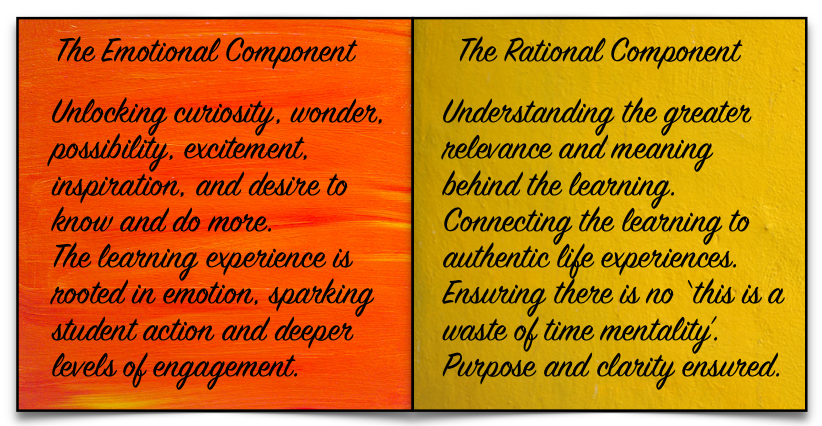Does your teaching build or stifle emotional momentum?I recently recorded a podcast in my #RunYourLife series with John Rinker, a very insightful and knowledgeable design teacher at Nanjing International School in China. John and I have had in-depth discussions many times in the past about the role of design thinking in education and the profound impact that it can have on student learning. In short, design thinking is all about improving the quality of peoples' lives and bringing about a better life experience both in and out of school. Often times there is a big misconception when it comes to design thinking in that many people believe it is all about creating an actual final product such as a table, chair, birdhouse, or other types of things. However, in reality, design thinking is all about the process of improving upon our lives by identifying problems and creating solutions through a certain cycle of innovative learning. To listen to John and I discuss the role of design thinking in teaching and learning, please click this link: http://21clradio.com/designing-way-good-life-run-life-18/ The focus of my blog post today is to deconstruct what it takes to create more emotional momentum in our teaching and in student learning. To emphasize this theme, I want to begin by sharing a great story from a recent Ted Talk I listened to given by Tony Fadell, a Lebanese-American inventor, engineer, presenter, and speaker who is responsible for creating one of the first versions of the iPod. In his Ted Talk, Tony discusses the need to create better solutions to life's real problems in an effort to bring about a more meaningful experience in peoples' lives. He delves into his own experience in designing the iPod and the depth of thinking that went into creating this product. Tony also discusses the critical importance of creating emotional momentum when it comes to customers wanting to use new products. The concept of 'emotional momentum' does not only apply to buying and using new products only, but is widely applicable across a multitude of experiences in our lives. Having underlying 'emotional momentum' in our lives greatly powers our learning forward and instills within us a greater sense of meaning and purpose. However, there are obstacles and frustrations that can stifle emotional momentum bringing it to a complete halt. In his Ted Talk, Tony gives a specific example of how this used to happen with Apple products years ago. Steve Jobs recognized early on in the design process that there was a massive 'emotional momentum' crusher working against the company when it came to all of their products. He couldn't tolerate it and demanded that the problem be resolved in order to encourage and strengthen the emotional momentum created when Apple customers first got home after buying their products. According to Jobs, he hated the fact that his customers were so excited to use their new purchase only to find out that they had to charge it for hours before actually being able to use it. He demanded that the problem be resolved and set his team of designers the task of ensuring this never happened again to any Apple customer. There would be no more 'CHARGE BEFORE USE' with any Apple product. Hence, Apple was the first company to have all of their devices fully charged and ready to go upon opening up the box after purchasing the product and many companies followed suit soon after. Tony Fadell uses this story to illustrate a very important point. The human experience must always be about creating positive emotional momentum, therefore removing brick walls and other forms of obstacles to this momentum must be of critical importance regardless of what it is we are trying to accomplish in life. Whether it be creating and building a new product, constructing new habits in our lives, changing our mindsets, or finding a love and passion for music, art, sport, or reading, THERE MUST be a strong component of emotional momentum fuelling us forward in any of our pursuits in life. There is no greater place for building, sustaining, and deepening emotional momentum than in our schools. The research clearly shows that when students are emotionally invested, learning takes on much more significance and meaning. I would present a strong case that teaching motivation is directly affected by levels of emotional momentum in action in their lives as well. When looking at creating a stronger sense of emotional momentum, Tony Fadell states that two critical components must be a part of everything that happens in the design process. Without question the same principles apply to both teaching and learning as well when it comes to creating more emotional momentum in our schools. Many of these things already seem so obvious to good educators, but I would argue that not enough time and energy is invested in creating more emotional momentum in our schools. In saying this, I am not only referring to student learning, teacher motivation and well-being carry equal significance in this process. It's not possible to always have our batteries fully charged and ready to go. I get this! I really do. However, creating more emotional momentum in both teaching and learning is an investment well worth the time and effort. Thanks for reading. Click on the link below to hear Tony Fadell's excellent Ted Talk.
2 Comments
Leave a Reply. |
AuthorKAUST Faculty, Pedagogical Coach. Presenter & Workshop Leader.IB Educator. #RunYourLife podcast host. Archives
September 2022
|
- Welcome
- All Things Teaching and Learning
- The Aligned Leader Blog
- Consulting and Coaching Opportunities
- My TED X Talk
- My Leadership Blog
- Run Your Life Podcast Series
- How PYP PE with Andy Has Helped Others
- Good Teaching is L.I.F.E
- The Sportfolio
- Example Assessment Tasks
- PYP Attitude Posters (printable)
- Publications


 RSS Feed
RSS Feed
